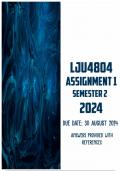, PLEASE USE THIS DOCUMENT AS A GUIDE TO ANSWER YOUR ASSIGNMENT
Please note that the author of this document will not responsibility for any plagiarizing you
commit.
1. Which legal categories are used in terms of the via media approach to classification?
The via media approach to classification in private international law involves using both the lex fori
and the lex causae for classification and then making a decision based on policy considerations. This
approach is contrasted with the enlightened lex fori approach, which primarily uses the lex fori but
considers the lex causae and may develop the lex fori based on policy considerations.
In terms of legal categories under the via media approach, it involves:
Lex fori: The law of the forum (the court hearing the case).
Lex causae: The law governing the substantive issue at hand.
The process under the via media approach involves classifying the legal issue according to both the
lex fori and the lex causae, comparing the results, and then making a clear choice between the two
based on policy considerations. This approach was endorsed in the case of Laurens v Von Höhne
1993 (2) SA 104 (W).
(Study Guide - Page: 18-19)
2. If you assume that, in terms of the South African rules of private international law, German
law determines the formal validity of a marriage, but that in terms of German private
international law, the matter is referred to Mauritian law, and that Mauritian law refers this
matter back to South African law, what would your answer to the following questions be?
2.1. If the South African court follows a partial renvoi approach, which legal system will be
applied to the formal validity of the marriage in question? Motivate your answer.
If the South African court follows a partial renvoi approach, it will consider the whole law of
Germany (the lex causae), including its private international law rules. Since German private
international law refers the matter to Mauritian law, the South African court will then consider
Mauritian law, including Mauritian private international law rules. When Mauritian law refers the
matter back to South African law, the partial renvoi approach means that South African law will
ultimately be applied to the formal validity of the marriage.
Motivation:
The partial renvoi approach assumes that the lex causae (German law) follows a no renvoi
approach. This means that the South African court will take into account the internal law of the
legal system pointed to by the private international law rules of the lex causae.
When German law points to Mauritian law, and Mauritian law points back to South African
law, the South African court will apply its own internal law to the matter.
Thus, under the partial renvoi approach, the formal validity of the marriage will be determined by
South African law.
(Study Guide - Page: 31-32)




